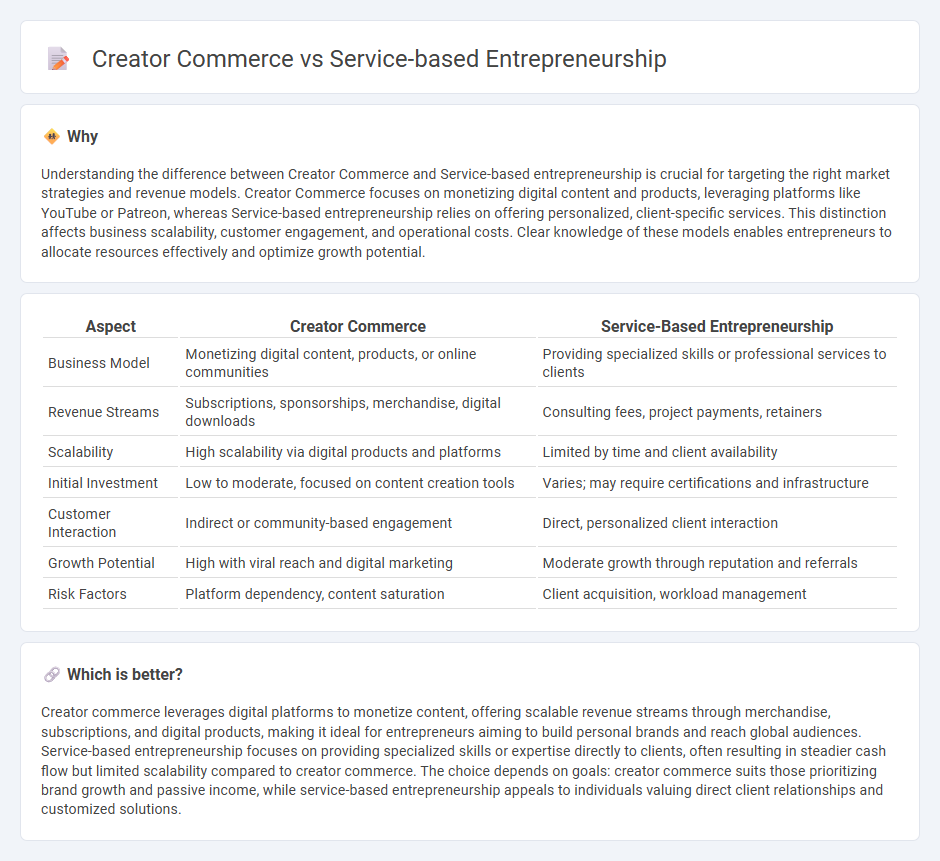
Creator commerce leverages digital platforms to monetize personal brands through content, products, and audience engagement, emphasizing scalability and passive income opportunities. Service-based entrepreneurship focuses on offering specialized skills or expertise directly to clients, prioritizing personalized solutions and client relationships. Explore the distinct advantages and strategies of each model to determine the best fit for your entrepreneurial goals.
Why it is important
Understanding the difference between Creator Commerce and Service-based entrepreneurship is crucial for targeting the right market strategies and revenue models. Creator Commerce focuses on monetizing digital content and products, leveraging platforms like YouTube or Patreon, whereas Service-based entrepreneurship relies on offering personalized, client-specific services. This distinction affects business scalability, customer engagement, and operational costs. Clear knowledge of these models enables entrepreneurs to allocate resources effectively and optimize growth potential.
Comparison Table
| Aspect | Creator Commerce | Service-Based Entrepreneurship |
|---|---|---|
| Business Model | Monetizing digital content, products, or online communities | Providing specialized skills or professional services to clients |
| Revenue Streams | Subscriptions, sponsorships, merchandise, digital downloads | Consulting fees, project payments, retainers |
| Scalability | High scalability via digital products and platforms | Limited by time and client availability |
| Initial Investment | Low to moderate, focused on content creation tools | Varies; may require certifications and infrastructure |
| Customer Interaction | Indirect or community-based engagement | Direct, personalized client interaction |
| Growth Potential | High with viral reach and digital marketing | Moderate growth through reputation and referrals |
| Risk Factors | Platform dependency, content saturation | Client acquisition, workload management |
Which is better?
Creator commerce leverages digital platforms to monetize content, offering scalable revenue streams through merchandise, subscriptions, and digital products, making it ideal for entrepreneurs aiming to build personal brands and reach global audiences. Service-based entrepreneurship focuses on providing specialized skills or expertise directly to clients, often resulting in steadier cash flow but limited scalability compared to creator commerce. The choice depends on goals: creator commerce suits those prioritizing brand growth and passive income, while service-based entrepreneurship appeals to individuals valuing direct client relationships and customized solutions.
Connection
Creator commerce leverages digital platforms to sell customized products, while service-based entrepreneurship focuses on offering specialized expertise and personalized customer experiences. Both business models depend on direct engagement with niche audiences, utilizing content creation and social media marketing to build trust and drive sales. This synergy enhances brand loyalty and scalable revenue streams by blending tangible goods with tailored services.
Key Terms
Client Acquisition
Service-based entrepreneurship emphasizes personalized client relationships and tailored solutions, leveraging networking and referrals to drive client acquisition. Creator commerce relies on digital platforms, content marketing, and social media engagement to attract and convert a broad audience into paying customers. Explore effective strategies for each model to maximize client acquisition and business growth.
Personal Branding
Service-based entrepreneurship relies heavily on personal branding to build trust, establish expertise, and attract clients seeking specialized skills or consulting. Creator commerce centers on leveraging personal branding to engage audiences, promote digital content, and monetize followers through merchandise, subscriptions, or digital products. Explore strategic personal branding techniques to enhance visibility and revenue in both entrepreneurial models.
Monetization Model
Service-based entrepreneurship monetizes through client projects, offering personalized solutions and recurring contracts, typically involving hourly or retainer fees. Creator commerce relies on leveraging content, digital products, and brand collaborations to generate revenue via direct sales, subscriptions, and sponsorships. Explore detailed strategies and income streams to maximize your entrepreneurial success.
Source and External Links
How to Start and Run a Service-Based Business - Bookeo - Service-based entrepreneurship involves identifying a niche service to provide, conducting market research to ensure demand and manageable competition, and systematically planning to efficiently launch and operate a service business.
What is a Service Business? A Beginner's Guide - Jobber - A service-based business focuses on delivering professional expertise, personal labor, or specialized services to clients, often covering sectors like health, IT, hospitality, professional services, transportation, home services, and personal care.
Top service based business ideas for 2025 - vCita - Service entrepreneurship is growing due to rising demand, low startup costs, flexible working hours, and opportunities for recurring revenue through personalized, tech-enabled service offerings that meet modern customer needs.
 dowidth.com
dowidth.com